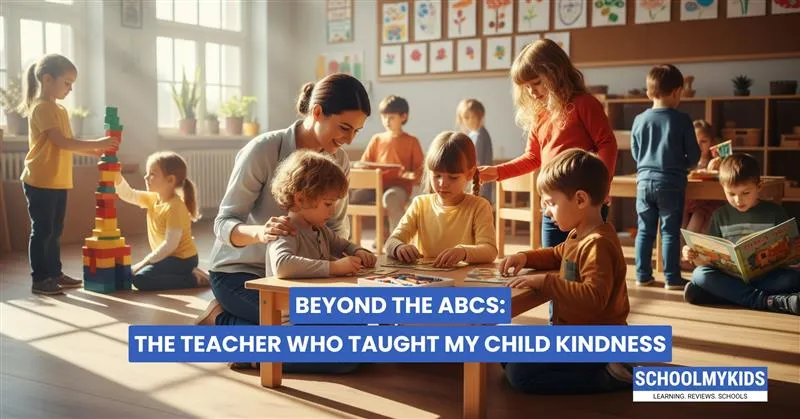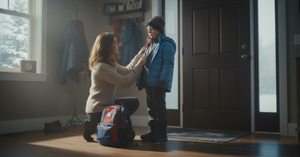When we think of school, the first things that come to mind are books, lessons, and exams. But if you ask a child what they really remember about their teacher, it’s often not the math problems or grammar rules. Instead, it’s the smile, the patience, and the little acts of kindness that leave a mark.
Every parent hopes their child learns good values at home. But sometimes kids pick them up even better in the classroom. Teachers don’t just teach the ABCs or multiplication tables. The best ones teach lessons of kindness, patience, and respect, often without even saying the words.
More Than Just Lessons on Paper
“My teacher said we should share our colors if someone forgets theirs.”
It’s not a part of the syllabus. There is no grade for it. Yet it is a powerful lesson, one that speaks about kindness and generosity. Teachers slip these values into ordinary school days, and kids carry them home like treasures.
Think about it: when a teacher waits patiently for every child to finish, they are teaching patience. When they gently remind kids to listen to each other, they’re teaching respect. These lessons go beyond the walls of the classroom and often stay longer than anything found in a book.
Learning Through Actions, Not Just Words
Children notice everything. They see the way their teacher greets the class with a smile, how they say “thank you” to the helper, or how they comfort a child who feels left out. These small actions speak louder than any lecture.
A teacher who never mocks a mistake teaches kindness simply through behavior. A teacher who praises effort instead of only results teaches encouragement. Children often learn more from these actions than from pages of notes.
A Second Home, A Second Role Model
For many kids, teachers are like a second parent. They spend hours together every day. Naturally, children begin to copy their teacher’s habits. If a teacher shows fairness, kids learn to be fair. If a teacher listens, kids learn to listen.
There are times when a child may not take the same advice from a parent, but when it comes from a teacher, it suddenly makes sense. Teachers carry a quiet influence. They shape not just minds, but hearts.
Stories That Stay
We all remember at least one teacher from our own childhood who left a mark. Maybe it was the one who encouraged us when we felt shy. Or the one who stood up for us when we were embarrassed. Or the one who believed in us when we didn’t believe in ourselves.
Our kids will have these stories too. And years later, they might not recall what chapter they studied in grade three, but they’ll remember the teacher who showed them kindness when they needed it most.
How Kids Can Appreciate Their Teachers
Teachers give so much, but your child can give back too. Showing appreciation doesn’t always mean big gifts or special events. Small actions can make teachers feel valued:
- Listen carefully: When teachers speak, listening closely is one of the best ways to show respect.
- Try your best: Effort matters more than perfect answers. Teachers love seeing students try.
- Say thank you: A simple “thank you” after class can make a teacher’s day.
- Be kind to classmates: Showing kindness to others is a way of honoring what teachers have taught.
- Remember their lessons: Using the values teachers share, like sharing, patience, and honesty, shows that their efforts truly matter.
When your child practices these small steps, they not only become better learners but also show their teachers that kindness is spreading, just as it was meant to.
Appreciating Our Teachers
As parents, we sometimes focus so much on grades and marks that we forget to thank the teachers for these life lessons. But maybe we should pause and appreciate them more. Because teaching a child to be kind is not just part of a job; it’s a gift that lasts forever.
So, to every teacher who teaches beyond the ABCs, who shows kindness in small and big ways, thank you. You may not realize it, but you are shaping not just students, but future humans who will carry your lessons into the world.








Be the first one to comment on this story.